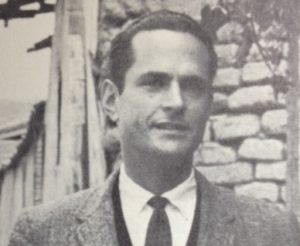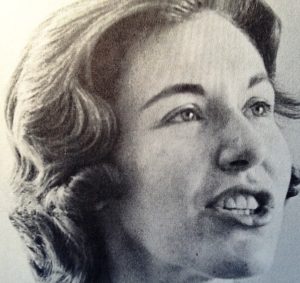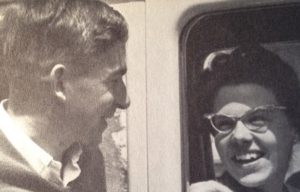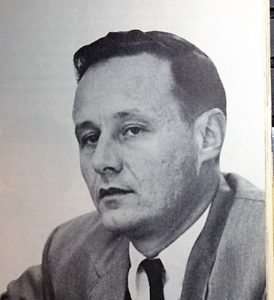Peru’s First Peace Corps Staff (Final)
Emory Biro was born and raised in Toledo, Ohio, and went to the University of Detroit, where he edited the college paper, and graduated in 1954 with a degree in political science. He was fired from his job as a college editor because of his last editorial, an attack on McCarthyism called “The Rise of Fascism in the U.S.”
Also in his undergraduate career, he had served as vice president of the university’s student council, vice president of the Detroit Interracial Council, and finally, vice president of the Migratory Workers Defense League.
In 1954, he moved to Chicago and went to work for the Catholic Interracial Council, of which Sargent Shriver was then president. Appointed to the CIC board, he served on it from 1957 until he came to the Peace Corps in 1962.
Biro, who spoke Hungarian before he spoke English, and who first learned Spanish working with braceros in Michigan, arrived in Lima in August, moved to Arequipa to get that office functioning, then return to Lima for the arrive of the first Volunteers.
 Dan Sharp from San Francisco, received his degree in Political Science and International Relations from the University of California at Berkeley. In 1954 he joined the Army as a Military Police Officer and went to Korea where he served alternatively as Commander of the Honor Guard, acting Assistant Division Provost Marshall and member of the Court fo General Courts-martial.
Dan Sharp from San Francisco, received his degree in Political Science and International Relations from the University of California at Berkeley. In 1954 he joined the Army as a Military Police Officer and went to Korea where he served alternatively as Commander of the Honor Guard, acting Assistant Division Provost Marshall and member of the Court fo General Courts-martial.
After his discharge he enrolled at Harvard Law School where was awarded an LL.B. in 1959. Sharp came to the Peace Corps in July, 1961, with a specialty in Latin American Affairs. He helped draft the report of the Regional American Assembly meeting on Latin American policy and was Secretary of the Commonwealth Club’s International Relations Section. He was chairman of the study group of the World Affairs Council of Northern California which pursued a three year program on the undeveloped areas.
The original staff in Peru—for a program that would become the second largest in the world with 427 Volunteers within two years—was completed with the arrival in September, 1962, of language expert Nancy McNulty.
 Born in Boston, McNulty graduated from Boston University in 1948 with a degree in Romance languages and literature. After a year on an exchange scholarship to the Escuela Normal Superior in Bogota, Colombia, she returned to Boston and received her M.A. in Spanish literature in 1951.
Born in Boston, McNulty graduated from Boston University in 1948 with a degree in Romance languages and literature. After a year on an exchange scholarship to the Escuela Normal Superior in Bogota, Colombia, she returned to Boston and received her M.A. in Spanish literature in 1951.
She then joined USIA for one tour and was sent to the Bi-national Center in Lima (also at the Center was William Warner, later to be Peace Corps Executive Secretary).
On the Berkeley campus of the University of California, McNulty gave lectures in how to teach English as a foreign language and began her own studies towards a Ph.D. in linguistics. She transferred both her studies and teaching to New York University’s Washington Square campus for the academic year 1957-58. She then joined the American Book Company as international book editor, involved principally in editing.
In the summer of 1960, she went to Africa for English Language Services Inc., of Washington, D.C., whose language laboratories were located on H Street, one block from the first Peace Corps headquarters.
This firm had a contract to institute the teaching of English in Guinea. As McNulty describes it, “This was before Guinea had kicked out the Russians. We think we were the prop which opened the door to future American foreign aid in that country –Guinea had rejected all previous U.S. advances. We got classes organized for every school teacher in the country’ for them, our seminars were compulsory. Back to Washington with English Language Services, I wrote texts, made language tapes, gave classes for teachers in methods of teaching.”
When the firm was asked by the Peace Corps to survey Spanish facilities at the camps in Puerto Rico and made recommendations, McNulty was one of two persons sent to make the survey—it was her first contact with the Peace Corps and it led to her meeting Mankiewicz. After a year in Peru, McNulty was transferred to the Colombia program before she returned to the U.S. in February, 1964.
Research Document: Who’s Who in the Peace Corps Overseas Administration (1963)
The photographs are by Rowland Scherman, Paul Conklin and Jim Walls, first photographers for the agency.


Frank Mankiewicz was country director when my former spouse Barbara Gurr (Peru 7) was stationed in the Altiplano in Puno on the shores of Lake Titicaca . She said that PC seldom had any staff in the area because of altitude sickness, spouses and children who could not acclimate, etc. As a result, she was largely on her own. She was assaulted by the local director of Corp Puno which was intended to interface with PCVs. She just walked out the door and went to the Maryknoll Sisters and commenced to teach ESL. She also resumed the work of former PCVs on a potting and weaving coop on the shores of the Lake, eventually seeing its handicrafts being sold in the Brooklyn Museum gift shop: Peace Corps ingenuity. However, when AmeriCorp*VISTA celebrated a five year anniversary, Frank, who was invited to speek immediately recognize my spouse and called her by name when he approached her after 40 years, so she must have made an impression. Sadly, she died two years ago, seven weeks short of out 50th anniversary; but, her accomplishments live on, thanks to the Peace Corps which allowed her to self-actualize.
I was a volunteer 64/66, mostly in Lima, teaching at UNI the Engineering Univ, and La Catolica Univ, I met my wife to be in Cusco, Maryellen Enright, who was the American Secretary/Admin running the Cusco PC office.
She had been in Peru since late 62, first as a Catholic Volunteer teaching at the Convent in Piura, then later in 64 recruited by Shriver to work for the PC. Maryellen transferred in 66 to the Lima office as Secretary/admin to the Doctor. She returned to US in 66 to attend NYU. We got married in NY in 67. Maryellen died of Cancer in AZ in early 99.
Bob Brannon/10/2020